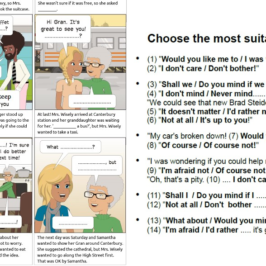Today we are going to look at how to write an Argumentative Composition. I am going to use two very different topics as examples:
ARE YOU A TEACHER? DOWNLOAD THE PDF. FOR YOUR CLASSES.
(A) The Advantages and Disadvantages of Internet as a Tool for Learning
(B) Should Faversville Town Centre be Pedestrianised?
So, how do we start?
1. Introduction
The Introduction should be quick and very direct. Don’t take many risks with the grammar at this stage. These are the best options:
- Explain why this topic is relevant nowadays.
- Write about how things have changed in the last 10 / 25 / 50 years.
- Start like this: “This topic can be seen from many different angles……..”
OK! Now, let´s put the theory into practice, using the sample essays above:
“(A) The Internet has affected almost every aspect of our lives in the last fifteen years, and how we should use it in the classroom is one of the most important debates in Education today.”
“(B) The recent debate about the pedestrianisation of Faversville town centre is one that should take into account all the different points of view in order to reach a satisfactory conclusion for as many people as possible.”
You see? In the first composition I use the option of comparing the present and past, which I think is the best option, where possible. In the second composition I combine the other two options.
2) Comparing two points of view
At this point we need to create an internal debate. It is important not to give our personal opinion until the end. We can use any of these options:
- The situation at the present time vs. In the past
(…tend to….) vs. (…used to…..)
If we choose this possibility, it gives us the opportunity to use comparatives, the present, past simple and present perfect. This works very well if we have chosen the second option in the introduction. - Advantages vs. Drawbacks
(On one hand…) vs. (On the other hand…)
This is a classic, but we have to be careful with this option not to be too basic with the grammar, because it is very easy to write only in present simple. If possible, use a passive tense: ‘It is said that…’, ‘It has been claimed that….’ - One point of view vs. Opposing viewpoint
(It is often said that….) vs. (Others claim…)
Another option is to compare two opposing groups of people. Again, try not to speak only in present simple- use conditionals, passive, etc.
To develop your argument, you can use these phrases:
Besides, = What´s more,
In fact, = As a matter of fact,
It has to be taken into account that….
That´s why….
(A) Before the invention of the Internet, learning at school used to be exclusively through the teacher, and although this is still generally true nowadays, many aspects have changed. It has become more and more common for students to be sent homework by email, and teachers tend to supervise students’ exercises on their computers in class.
This means that learning has become more individual and closer to the student, as he or she can look for information independently, making project work easier and more relevant.
(Notice that I have used: Past Simple, Present Simple, Present Perfect, Passive (‘to be sent’ and comparatives, as well as ‘used to’ and ‘tend to’.)
(B) It can be said that there are many advantages to pedestrianisation, but – on the other hand- many people have pointed out the drawbacks. Even shopkeepers have disagreed. Clothes shop and Café owners prefer the streets to be pedestrianised, while those shops such as hardware stores or supermarkets have declared their opposition to the scheme.
What’s more, even residents differ. The advantage of traffic-free streets and quiet nights has to be weighed against the inconvenience of parking some distance away, or buying or renting a garage.
(Notice again the use of passive – ‘can be said’, ‘to be pedestrianised’, ‘has to be weighed’. In the second sentence I initially wrote ‘There are disagreements between shopkeepers’ before realising that I was repeating ‘there are’. Try not to repeat!)
3. Specific Example
- Here we talk about something specific (it can be invented) to support one side of the previous argument and prepare for the conclusion. We can use expressions such as:
According to…
As reflected / demonstrated…
In a recent survey carried out / documentary shown on television / article published in ‘The News’ …
(A) According to the CCB, although Internet use has increased by 65% in schools over the last ten years, this has not been reflected by a similar growth in education standards, as demonstrated by recent PROSA reports. What’s more, there seems to be no difference in academic excellence between those schools with the latest technology (tablets, electronic whiteboards, etc.) and those without.
(B) In a recent survey carried out by the town council, Faversville residents have shown themselves equally divided. 43% have declared themselves in favour and 39% against, with only 18% answering ‘Don’t know’ or ‘No opinion’.
(I have completely invented figures and abbreviations. This does not matter. What is important is that the paragraph takes us out of the present simple and adds weight to our composition.)
4. Opinion/Conclusion
Here we give our personal opinion, remembering that our personal opinion has NO importance. What is important is the grammar, and grammar which has not been used in the composition. These are the best options:
- (future simple)
Hopefully there will be……..
I am sure that in 10 years time…… - (1st conditional)
If ….(present simple).. , ….(will/won’t + infinitive) - (2nd conditional)
If I were ………… I would + infinitive - (3rd conditional)
If I had + pp ………. I would have +pp…… - (Mixed conditional)
If I had + pp ………..I would + infinitive
And these are useful expressions:
Personally speaking,…
To sum up,…..
All in all, ….
(A) To sum up, I do not believe that more technology is a solution in itself. If we replaced teachers with computers, education standards would suffer enormously. If experts can maintain a balanced and careful debate, hopefully we will be able to combine the best of both worlds.
(B) Personally speaking, I believe that opinion is too divided to go ahead with this project for the time being. If surveys had demonstrated a greater support among residents, I would have no oppostion to pedestrianisation. This scheme will still be possible in the future if there is greater agreement among residents.
(If you need help with your conditionals, click here)
General Rules:
1) Do not contract words (didn’t, there’s, won’t) and use formal or semi-formal language- be careful with phrasal verbs, as most of them are for conversational use.
2) Try not to repeat words or structures, especially in the same paragraph.
3) Use a variety of tenses – past, present, future – as well as conditionals, passives and comparatives. It is very easy to talk only in Present Tense. These models help you avoid this.
4) Be direct, concise and clear in meaning. If you’re not sure what you want to say in your language, in English it will probably be very confusing. Be careful with long sentences and control the essay!
5) Don’t try to talk about too many things. In these compositions I have not written about how teachers have to adapt to new technology, about how students can be distracted, how they already spend too much time in front of a screen, about concentration span….. It’s too much!
6) This is the general outline of a composition, but you will have to adapt it not just to the topic you have to write about or the amount of words. Some teachers (like me) mark in positive for ambitious structures and use of language- others simply mark down mistakes. You need to know what your teacher or examiner wants from you.
These are the full Compositions:
[responsivevoice]The Advantages and Disadvantages of Internet as a Tool for Learning.
The Internet has affected almost every aspect of our lives in the last fifteen years, and how we should use it in the classroom is one of the most important debates in Education today.
Before the invention of the Internet, learning at school used to be exclusively through the teacher, and although this is still generally true nowadays, many aspects have changed. It has become more and more common for students to be sent homework by email, and teachers tend to supervise students’ exercises on their computers in class.
This means that learning has become more individual and closer to the student, as he or she can look for information independently, making project work easier and more relevant.
According to the CCB, although Internet use has increased by 65% in schools over the last ten years, this has not been reflected by a similar growth in education standards, as demonstrated by recent PROSA reports. What’s more, there seems to be no difference in academic excellence between those schools with the latest technology (tablets, electronic whiteboards, etc.) and those without.
To sum up, I do not believe that more technology is a solution in itself. If we replaced teachers with computers, education standards would suffer enormously. If experts can maintain a balanced and careful debate, hopefully we will be able to combine the best of both worlds.
(224 words)
[/responsivevoice][responsivevoice]Should Faversville Town Centre be Pedestrianised?
The recent debate about the pedestrianisation of Faversville town centre is one that should take into account all the different points of view in order to reach a satisfactory conclusion for as many people as possible.
It can be said that there are many advantages to pedestrianisation, but – on the other hand- many people have pointed out the drawbacks. Even shopkeepers have disagreed. Clothes shop and Café owners prefer the streets to be pedestrianised, while those shops such as hardware stores or supermarkets have declared their opposition to the scheme.
What’s more, even residents differ. The advantage of traffic-free streets and quiet nights has to be weighed against the inconvenience of parking some distance away, or buying or renting a garage.
In a recent survey carried out by the town council, Faversville residents have shown themselves equally divided. 43% have declared themselves in favour and 39% against, with only 18% answering ‘Don’t know’ or ‘No opinion’.
Personally speaking, I believe that opinion is too divided to go ahead with this project for the time being. If surveys had demonstrated a greater support among residents, I would have no oppostion to pedestrianisation. This scheme will still be possible in the future if there is greater agreement among residents.
(208 words)
[/responsivevoice]Now try writing a composition on one of these themes:
- The benefits of Shopping over the Internet
- Is City Life better than living in the Country?
- Climate change: Is there still time to save the planet?
- Young Criminals: Is Punishment the Remedy?
- The Future of Education: Time for Change?








Leave a Reply